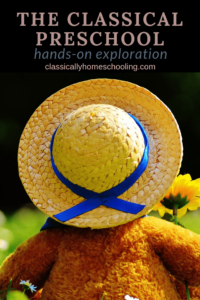The Well-Trained Mind: The Preschool Years
This post may contain affiliate links. For more information, please read my disclosure policy.
The Well-Trained Mind: The Preschool Years
The preschool years are about introducing our little ones to the world. Introducing them to new wonders. We’re unlocking doors. Unlocking the Doors: The Preschool Years is the apt title of the fourth chapter of The Well-Trained Mind.
Unlocking the Doors covers the academic preparation children need during the preschool years to be ready for a rigorous classical education beginning in the first grade. Children need a language-rich environment to be ready for a language-rich education.
The emphasis isn’t actually on teaching. Rather the emphasis is on parenting your young child. Through your daily interactions with your child, you gradually and gently introduce the fundamentals of reading, writing, and arithmetic.
Birth to Three
Your goals are simple over the first few years. Give your baby a language-rich environment by turning off the television and talking to your child. Adult talk or baby talk, it doesn’t matter. Just chat about what you’re doing and why.
Remember to read as well. Read picture books, board books, cloth books, short stories, and magazines. Listen to books on tapes. Ask questions about the stories you read.
What did the gingerbread man do? Why did everyone chase him?
The Well-Trained Mind also has benchmarks of what children need to know by the time they turn four. These benchmarks include letter names and sounds as well as counting.
Suggestions are also given for how to meet these benchmarks while maintaining a relaxed atmosphere in the home.
Preschool and Kindergarten (4 and 5)
At the age of four, The Well-Trained Mind recommends you begin phonics. This should be no more optional than expecting a child to try new foods or help pick up toys. You simply sit down for 10-15 minutes to practice every day.
Writing should be separated from reading as children’s fine motor skills develop at different rates. It’s recommended you begin with the alphabet before moving on to simple words.
Math skills are developed at a gentle pace through counting exercises, cooking, and card games. Plenty of play with manipulatives is recommended as well.
 You don’t need fancy teddy bears; beans, marshmallows, fruit, and buttons work just as well.
You don’t need fancy teddy bears; beans, marshmallows, fruit, and buttons work just as well.
The Well-Trained Mind includes plenty of advice on how children learn. There’s no complicated system for a busy mother to keep track of. Instead, suggestions are given on how to fold the lessons into daily life.
On a personal note, I discovered The Well-Trained Mind: A Guide to Classical Education at Home when my oldest son was four. It developed the heart of my preschool plan for him and subsequent children ever since.
The closer we stuck to the suggestions, the better the children were prepared for 1st grade and later studies.
While I keep dreaming of fancy preschool plans for my little ones, we’ve ended up sticking with the tried and the true: A Well-Trained Mind preschool.
Recommended Reading:









I LOVE the Well trained mind! Thanks for the overview! 🙂
I’m glad that I am not the only one planning my summer activities.
Thanks for the information! I love the gentle approach!
Thanks for stopping by. 🙂
Great overview of the chapter! Did you know that we went through the WTM last in the Classical Mamas Read bookclub. Here’s the link if you’d like to read my thoughts on this chapter. Do you mind if I add your post to the link-up? I’d love to add your thoughts to the discussion! (Just let me know if you want me to take it down.)
I don’t mind at all! Thank you for adding me and for including the link to your thoughts on the chapter. 🙂